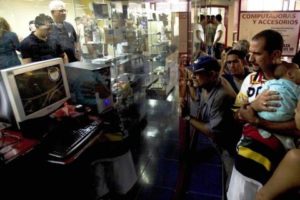
One of the many regulations contained within the U.S. Helms-Burton Act of 1996 is a ban preventing Cuba’s use of a fiber-optic underwater cable that connects Miami and Cancun and runs only 32 kilometers from Havana. The ban thus severely limits Internet exchanges by users on the island because instead of the high-capacity cable, Cuba must use low-capacity satellite linkages. But an agreement signed by Cuba and Venezuela on January 24, 2007 began a process to circumvent the U.S. blockade: Telecom Venezuela and Cuban Telecommunication Signals Transport Company (Transbit) agreed to work together as one entity, the Gran Caribe Telecommunications Company, to lay two pairs of fiber-optic cables from Vargas in Venezuela to Santiago in Cuba. The use of these cables could increase the island’s international communications capacity by 1,000-3,000 times.
Meanwhile, Cuba’s 13th International Technology Fair (Informatica 2009) took place last week in Havana. Wilfredo Morales, President of Gran Caribe, took the opportunity to reaffirm his project’s capacity (and intention) to undermine the U.S. telecommunications embargo of Cuba.
Este proyecto es ya una realidad, rompe con el bloqueo en esta área y permitirá a Cuba estar en mejores condiciones para continuar su desarrollo y utilización masiva de las nuevas tecnologías.
The project is already a reality, and it will break the embargo and allow Cuba the capability to continue its development and massive utilization of new technologies.
Morales hopes that the project will be completed in early 2010, and that the cables will be operative by the second half of that year. Expensive as the project is, it will effectively render the U.S. telecommunications embargo useless, providing further evidence that attempting to isolate one country in an interconnected world is a fool’s enterprise.
Read more about the project here.